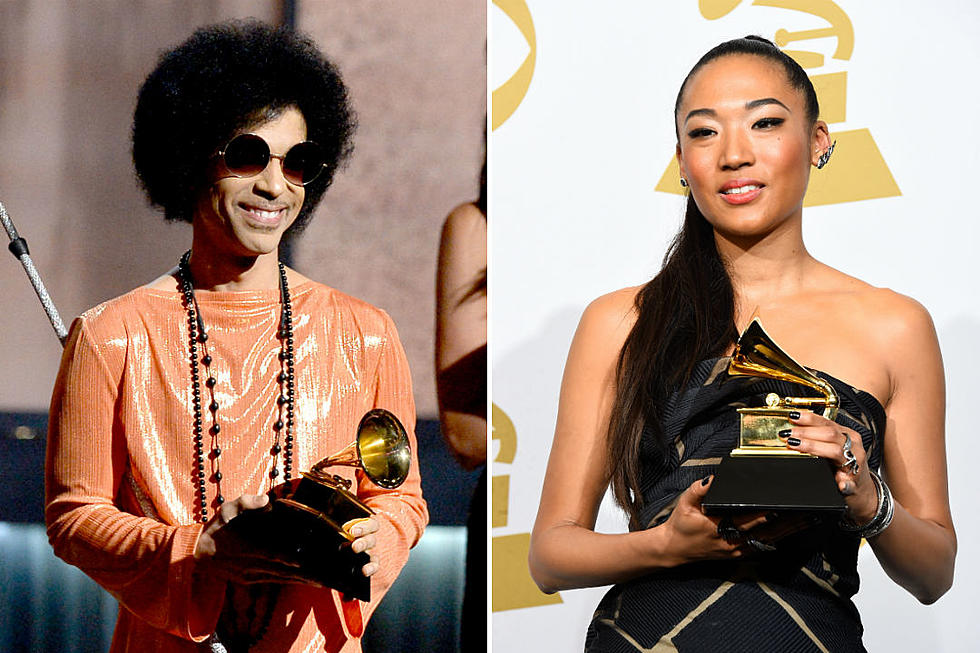
Album Review: Judith Hill, ‘Back in Time’
On Tuesday (March 24), if you’re on Live Nation’s email list, you may have received an amusing email from Prince: “Sorry 2 bother U,” he wrote. “Just wanted 2 send U this baby picture of Judith Hill with Her 1st piano. Loox like her parents, who r also musicians -- had a plan. Well, that plan succeeded. This is Judith Hill's debut album Back In Time. Please spend some time with this music and then share it with someone U love.”
Most people first encountered Hill in the Oscar-winning documentary 20 Feet From Stardom. That movie focused on the plight of several backup singers, black women who sang behind the biggest stars in pop, rock and R&B during the ‘60s, ‘70s and ‘80s. Hill was an outlier, born in 1984 and working in a musical world light-years away from the one encountered by her co-stars (Darlene Love, Lisa Fisher, Claudia Lennear and Merry Clayton).
Not that everything has changed in the biz -- the industry is still dominated by men. And not all changes are for the better: In a world of shrinking label budgets, it’s probably harder than ever for a backup singer to make a living. On the other hand, when the famously-insane Phil Spector was being his usual domineering self, Darlene Love couldn’t throw a bunch of her demos on Soundcloud; Love also couldn’t expand her audience on reality TV (Hill competed on the The Voice). Hill mainly appeared in the undercooked final segment of 20 Feet From Stardom, as if the director Moran Neville wanted to say, “Look, these issues still exist today!”
Her inclusion in the film makes somewhat more sense when you listen to Back in Time: Hill is old at heart, and her new album is adamantly retro, marking her as the latest entrant in the increasingly-crowded market for vintage R&B. Most of the artists mining this territory fall into three camps. In one, you have commercial juggernauts like Adele, who take the old bones of soul and spruce them up with contemporary production. In another, you have a singer like D’Angelo engaged in a monomaniacal project to push beyond the limiting tropes of classic R&B. The third is populated by labels like Brooklyn’s Daptone, who refuse to update the old-school sound in any way.
This is where Hill settles. She has a strong voice with range and a tough, sandpapery touch. She’s confident working with a brass section -- potent horns might overwhelm a lesser singer -- and displays wide knowledge of her source material, picking and choosing what she wants from ‘70s and ‘80s funk. Sometimes that means a Gap Band beat, sometimes itchy blues guitar -- by way of Johnny Guitar Watson on album opener “As Trains Go By” or the Meters on “Turn Up.” The hook to “Jammin’ in the Basement” echoes a rowdy collaboration between Etta James and Sugar Pie DeSanto (also titled “In the Basement”). “Angel in the Dark” is the only song on the album with touches of the ‘10s -- a hint of trap percussion infiltrates the beat.
But the ability to manipulate the material of the past doesn’t automatically create an exciting present. Look at the career of Hill’s new mentor, Prince: Once he defined the cutting edge of pop, but for years he has been content to sit back and preach the virtues of mild, innocuous funk, unable or unwilling to engage with new developments in hip-hop and electronic music. On her debut, Hill seems to have boxed herself in with the belief that having a modern sound and producing vibrant songs are mutually exclusive.
The limitations of this approach become clear when she uses recent slang at odds with her old-fashioned style. On “Wild Tonight,” Hill drops the word “ratchet” -- a term also used to describe the sound of debauchery-heavy west-coast hip-hop and R&B -- which is amusing mainly because the sound here is so tame. She names one of her funk grooves “Turn Up,” but the command in the title seems like wishful thinking.
Vibrant songs can exist with modern sounds, but like Prince, Hill stays focused on the past.
More From Diffuser.fm









